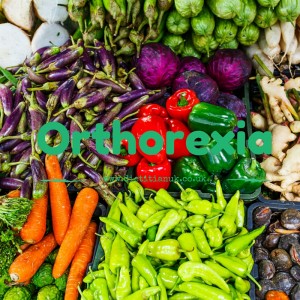If you read my blog regularly you will know that healthy eating is definitely something that I promote. Sometimes, there can be point where healthy eating goes a step, or several steps too far. Can we be too healthy with our eating?
The rise of healthy eating blogs, clean eating movements and instagram gurus has led to there being almost too much access to information, recipe and tips. As well as the not always qualified voicing their nutritional opinions. This can lead to confusion and information overload.
What is Orthorexia?
Orthorexia Nervosa is a relatively new term meaning a “fixation of righteous eating”. It was first used in 1996 by Steven Bratman, MD. It is not yet recognised as a fully fledged eating disorder in the diagnostic criteria, but is definitely something that is on the increase.
People with orthorexia may not notice they have an issue with their eating, in face they may think the opposite. They can start out trying to eat a healthier diet but get drawn into the spiral of trying to eat a healthier and healthier meal plan. They become consumed with food, trying to eat right, being strict with their food intake and restricting the foods they are allowed to have. Purity, eating the healthiest foods they can and guilt if they stray off the plan are hallmarks. This can lead to an obsession with weight, shape and calories. Weighing food and adding in specific “health” foods can also creep in.
There are usually underlying issues that precipitate Orthorexia. This could be a need to escape, feeling out of control and needing to control an area of life, feeling a loss of identity. Suddenly finding an outlet in the form of control via eating can help fill that void. It starts out seeming like a healthy way to deal with your feelings, but then spirals out of control.
Why is it a problem?
Although on the surface a diet may sound healthy, when you dig down it is usual to find nutritional deficits in the diet. A lack of calcium for example, that can affect bone health. A lack of essential fatty acids, affecting brain function, skin and blood flow.
More noticeable is often the weight loss that ensues and the affects on socialisation. Physical side effects of weight loss can include: poor circulation, feeling cold, hair loss, poor concentration, memory and reactions times, low mood and mood swings, being unable to eat out, wanting to isolate yourself, fatigue and a general lack of lustre. People can feel consumed with the need to know what they are eating each day, needing to prepare it all themselves, planning meals and recipes far in advance and this becoming all-consuming. There can be a loss of hunger and fullness signals, with increased anxiety around meals.
Dr. Bratman, who recovered from orthorexia, states “I pursued wellness through healthy eating for years, but gradually I began to sense that something was going wrong. The poetry of my life was disappearing. My ability to carry on normal conversations was hindered by intrusive thoughts of food. The need to obtain meals free of meat, fat, and artificial chemicals had put nearly all social forms of eating beyond my reach. I was lonely and obsessed…I found it terribly difficult to free myself. I had been seduced by righteous eating. The problem of my life’s meaning had been transferred inexorably to food, and I could not reclaim it.” (Source: www.orthorexia.com)
So a healthy diet is bad for me?
Well it can be, if it takes over your life, your thinking, your time and leaves you with feelings of anxiety, guilt and self-loathing. If you are not able to relax and eat cake now and again then that is not normal eating.
How to get help?
- Recognise the problem. This is a huge step.
- Talk to your GP and ask for advice. They may be able to refer you to a local eating disorders team.
- Look for an eating disorders specialist who can work through your food beliefs and give you the confidence to make changes.
